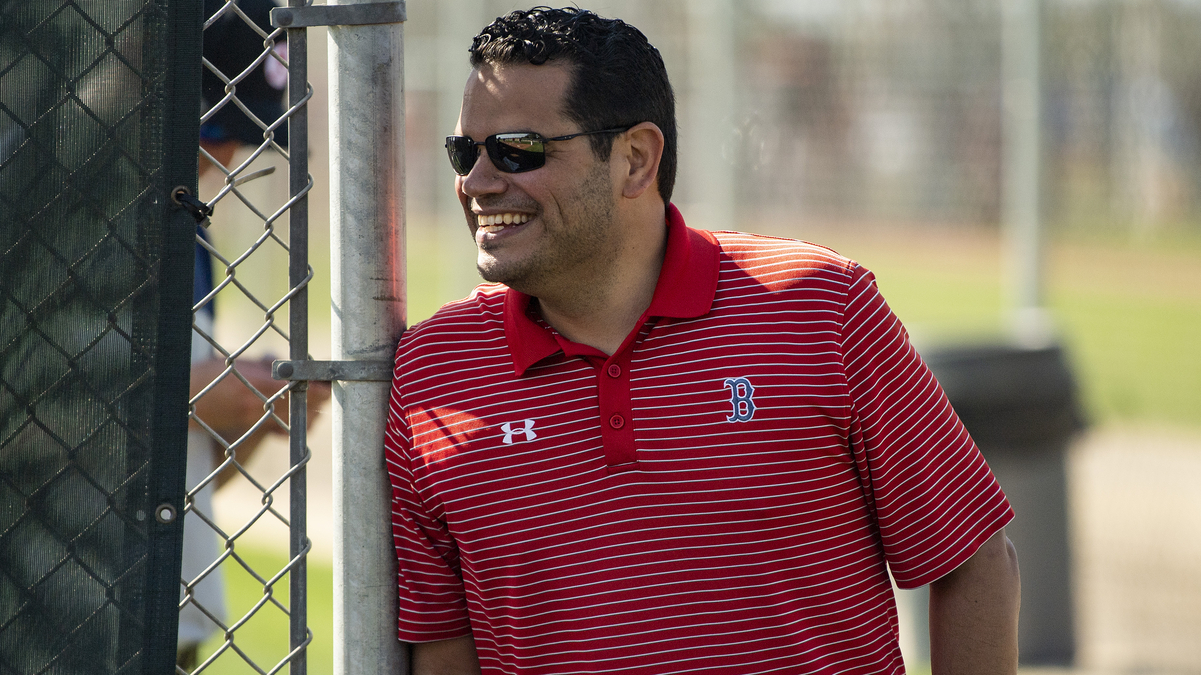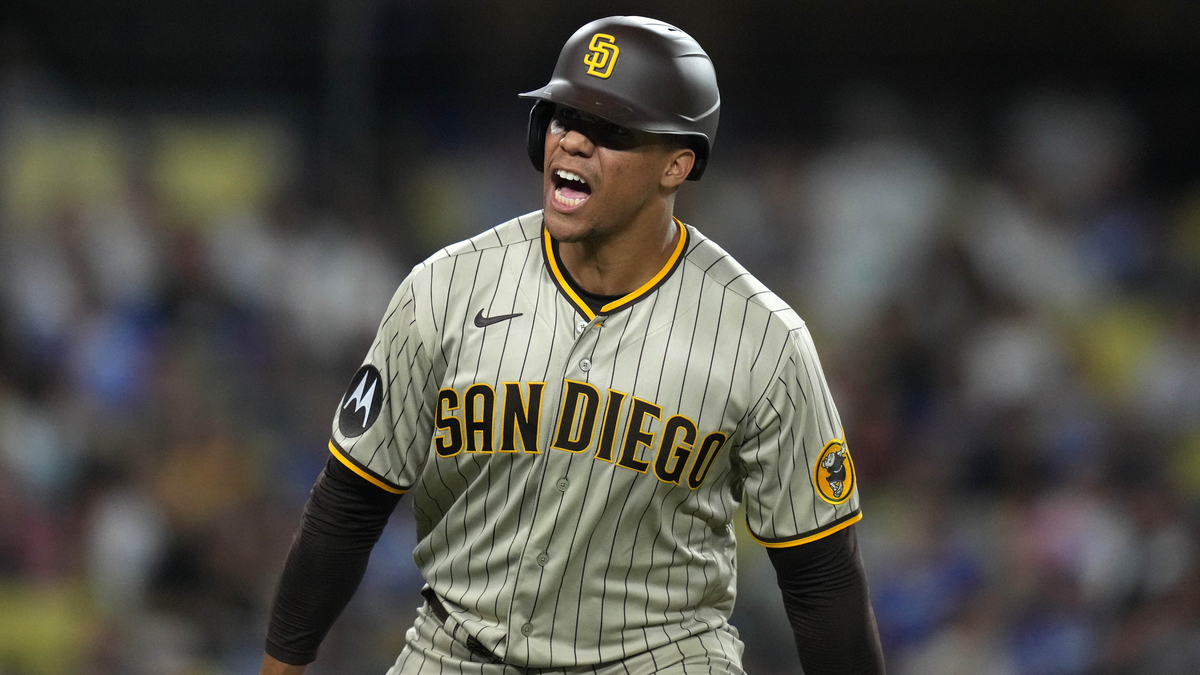Only four teams remain in baseball's postseason, and it sure feels like we're barreling towards a Rangers-Phillies World Series, thanks to a pair of relentlessly punishing offensive attacks.
As the Red Sox watch from afar, there's plenty they could learn not just from Texas and Philadelphia, but the other finalists, the Astros and Diamondbacks, as well. Let's take them one by one.
Phillies: Spend, spend, spend
Stay in the game with the latest updates on your beloved Boston sports teams! Sign up here for our All Access Daily newsletter.
The championship era of Ryan Howard, Chase Utley, and Jimmy Rollins gave way to a dark decade that saw Philly go nine straight years without posting a winning record.
They turned things around the old-fashioned way, by spending like crazy. They signed Bryce Harper from the rival Nationals for over $300 million, and landed his ex-teammate, Trea Turner, for a similar figure last winter. They acquired All-Star catcher J.T. Realmuto from the Marlins and then extended him for $115 million. They thanked the Mets for Zack Wheeler with $118 million. They watched Kyle Schwarber rise to the occasion with the Red Sox and signed him for $80 million.
It's hard to imagine they regret any of those deals, especially now that Turner is finally hitting after a lackluster summer. Harper is the face of their franchise and a face of the game, a Sports Illustrated coverboy at age 15 who has transformed himself into of the game's grittiest superstars. His staredown of Braves antagonist Orlando Arcia belongs in the Louvre.
Everyone on the roster hits bombs, and Dave Dombrowski has built a club that plays its best in October. The result is an absolutely raucous Citizens Bank Park that harkens back to the 2003-04 days at Fenway and should prove to an organization trying to generate buzz that you won't get there by finding value.
Give your fans recognizable stars who deliver when it matters, and you won't care what they cost.
Diamondbacks: Build, build, build
At the other end of the spectrum, the D'Backs are one version of what the Red Sox hope to be: a middling payroll team built around a homegrown star, demonstrating that barely squeaking into the playoffs with 84 wins can be just as good as roaring into them like the 100-win Braves or Dodgers.
There's more to Arizona than runaway Rookie of the Year favorite Corbin Carroll, however. Under general manager Mike Hazen, the Diamondbacks obtained ace Zac Gallen in a trade with the Marlins for future All-Star infielder Jazz Chisholm. They picked up No. 2 starter Merrill Kelly off the waiver wire from the Rays. They weren't afraid to send one of their top young players, outfielder Daulton Varsho, to the Blue Jays for prime catching prospect Gabriel Moreno.
MORE RED SOX COVERAGE
Of all the teams on this list, the Diamondbacks are probably the one whose example should scare Red Sox fans the most. They are, after all, the embodiment of the idea that just reaching the playoffs is enough, because the rest is a crapshoot. That's why they're still playing while Atlanta and L.A. watch from home.
Rangers: Never settle
Texas appeared headed for a steep decline after the final years of Jon Daniels' tenure resulted in a series of misfires. From 2010-16, the Rangers made the playoffs five times and the World Series twice, including a classic seven-game loss to the Cardinals that rivals any heartbreak in Red Sox history.
They dipped below .500 in 2017 and stayed there until winning a surprising 90 games this year. They turned things around by spending big in the middle infield on shortstop Corey Seager and second baseman Marcus Semien, but also by continually augmenting, right through the trade deadline, when they were the most aggressive team in baseball, despite racing to a lead in the AL West.
They weren't satisfied with a rotation fronted by postseason ace Nathan Eovaldi, so they acquired Max Scherzer and left-hander Jordan Montgomery. To the bullpen, they added former All-Star Aroldis Chapman. They went 12-2 right after the deadline before falling into a killer funk and losing eight straight.
Rather than implode, they held on for a wild card berth and have since pounded the ball in the postseason, where they're 7-0 after sweeping the Rays and Orioles and taking the first two games of the ALCS in Houston.
The Rangers are what happens when your front office isn't afraid to be bold. They've acquired All-Stars in virtually every way imaginable, from drafting and developing 2019 first-rounder Josh Jung, to acquiring catcher Jonah Heim from the A's for a washed-up Elvis Andrus, to straight buying slugger Adolis Garcia from the Cardinals. Their latest breakout star is 2020 second-rounder Evan Carter, who's hitting .350 in the postseason despite not even making his big-league debut until Sept. 8.
If there's a lesson in Texas' success, it's to remain open to any and all avenues of improvement, even when things appear to be going well.
Astros: Umm, cheat?
No one wants to copy Houston's approach, given how the Astros won their first World Series in 2017. The game's most villainous organization is a study in flexible continuity, however, because it has survived three baseball bosses in the last five years to continue reaching October.
The defending World Series champs are playing in their seventh straight American League Championship Series, and even if they fall short of a return to the biggest stage this year, they remain a prime example of the power of building a winning culture.
Outside of Jose Altuve and Alex Bregman, the faces have mostly changed. Carlos Correa, George Springer, and Dallas Keuchel are long gone. They've continued developing stars at an impressive rate, though, from Kyle Tucker to Jeremy Pena to basically their entire starting pitching staff. They also had the foresight to acquire postseason destroyer Yordan Alvarez in a minor 2016 deal with the Dodgers, and anytime the rotation needs a boost, they go out and acquire Justin Verlander.
The Astros have mastered the art of saying goodbye to All-Star stalwarts when they get too expensive and remorselessly moving on to someone else, an area where the Red Sox have traditionally struggled.



